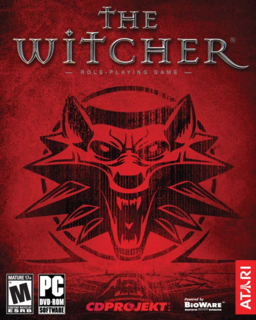There's atmospheric. Then there's The Witcher.
As it happens, though, this game will not show it’s true face in the prologue either. While great as a tutorial, the beginning of Witcher is also its least impressive segment. But that's part of the appeal and greatness of it. The Witcher is a game that becomes better every minute, however it does it so subtly that you might take this for granted unless you finish it.
From the very outset, you will notice that the combat system is entirely new and entirely enjoyable. There are three main types of battle stances: fast, strong and group - each with their individual attacks; also, there are two types of swords: steel, which is used on humans, and silver for non-humans. There are alternative weapons, yet those become outpowered past a certain, very early point. If you're willing to spend some gold or to harvest the fruits of some very scattered plants, you can go for the easy-to-use alchemy to aid yourself in fights. Another original feature is the level-up system, which is arborescent, yet simple and powerful.
The setting is presumably medieval England. It serves as a distinctive, suitable place for the story to unfold. As far as the story itself goes, it provides the main source of continuity to the game. For Oblivion or Fable, it is the openness of the world. The Witcher neither claims, nor needs that permanent freedom of movement. In the 5 chapters of the game, you'll find yourself exploring roughly 5 distinct vast areas. This is not to add any sense of obligation to the player, since the quests can be approached at any given time.
As a great, haunting and engrossing story wasn't enough, the game also offers you choices which impact the outcome of the story and most of your relationships with the key-characters. In that respect, The Witcher, in unmistakable Witcher-like fashion, does a sensible, apt job. Unlike the cartoony good/evil choices in games such as Fable, Jade Empire or Star Wars:KOTOR, CD Projekt has opted for pro-human, pro-non-human and neutral alternatives, which actually make sense in the game's universe.
Because Witcher gets better every minute, the last chapter is the most memorable piece of gaming I've experienced since playing Gothic. What the latter did best was employing the Will to Power in an interactive game. In other terms, starting out as a bum who is tossed about by small-time thugs and gradually emerging at the top. This can be seen comparatively often in the history of gaming, even in games other than RPGs, only to a lesser degree. Such is the case with the GTA series. To achieve it completely, you must avoid making the game's world evolve in the same pace that you do, as in The Elder Scrolls series. This is where The Witcher shines. Here, you are given the opportunity to feel powerful, but half-way or more into the game. The most important aspect of this game is the fact that it becomes more and more rewarding, the more you play it.
The combat, the story, the characters - what would these be without art direction? The way matters stand, with the music being one of the most suitable in tone hitherto in any game and often perfectly enjoyable as a stand-alone, as well as the beautiful graphics, this is about as far as atmosphere can go. Listening to the main theme of the game will send you back to the time you played it even if it's a whole year later.
All of this is not to say that the game doesn't have it's share of flaws, such as the shortage of character models or the occasionally problematic voice acting, but simply that these flaws are almost entirely made up for. If you're looking for a quality RPG or indeed a game of any genre, look no further, because The Witcher provides excellence in gaming.

